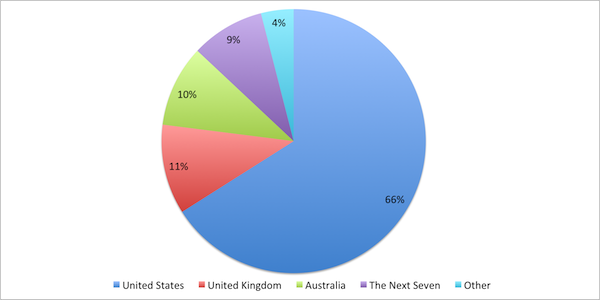If you’ve ever spent long in international education circles, you’ll know that one of the standard mantras around support for internationalization is the importance of study abroad for helping Canadians gain intercultural competencies and projecting Canadian soft power. When abroad, Canadian students spread sunshine and light about their home. Upon their return, their knowledge of foreign cultures should make them better global citizens and help the country both commercially and diplomatically.
In 2008-09, UNESCO reported that there were roughly 44,000 Canadians studying in other countries. So what new frontiers are Canadians studying abroad opening up for us?
Proportion of Canadians Studying Abroad, by Country, 2008-09
(The “Next Seven” are France at 3%, and Ireland, Germany, New Zealand, Japan, Poland and Switzerland all at 1%.)
The large numbers in the US shouldn’t be a huge surprise, given proximity, size, prestige and choice. Top American institutions are world-beaters who will always attract top students. American religious schools will always be a big draw for a certain section of our population (Brigham Young reliably draws between 400 and 500 Canadians a year). Entrepreneurial border institutions which feed off the idiosyncracies of Canadian policy will always prosper (Buffalo’s D’Youville College only exists by serving the 1,000 or so students a year who want an Ontario’s teacher’s certificate but are rejected by Ontario institutions).
But what’s going on everywhere else? That’s not exactly a list of countries that screams “openness to world cultures” or “places with which Canada needs to connect better.” Sure, they have some good universities, but their relative positioning makes one suspect there’s a holiday element here (Australia at three times France? At ten times Germany? Come on). Sure, there’s a language barrier – but that hardly reflects well on us either, does it?
Now, it’s true that UNESCO data on international mobility is notoriously lousy because of differences in national data collection and reporting practices. These numbers almost certainly don’t include students on shorter-term exchanges, for instance. But that’s unlikely to be a major distorting factor. When HESA asked students about their short-term exchange preferences, they came back with a list which was very similar to this one.
The fact is, Canada is more provincial than we’d like to admit. We believe the Heather Riesman pablum about “The World Needs More Canada” and never consider that the reverse might be true. At an intellectual level, such international engagement as we have looks backward to our European and Commonwealth past, and not to our future with Asia and Latin America.
The promise of international education as a way to help Canada find a place in the world simply isn’t being met. It’s time we asked more searching questions as to why that is.


 Tweet this post
Tweet this post

The state of Canadian students abroad is even more embarrassing when viewed in light of Europe’s Erasmus Mundus mobility programming.
All institutes are telling just about the positive points of studying abroad but after reading this post i get to know the disappointments of studying abroad. Thanku for making us awake and giving us details.